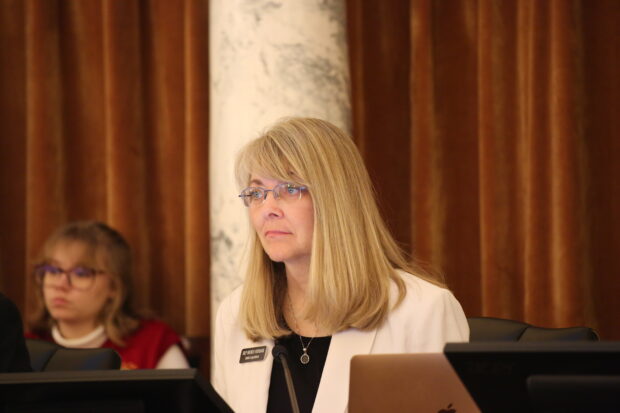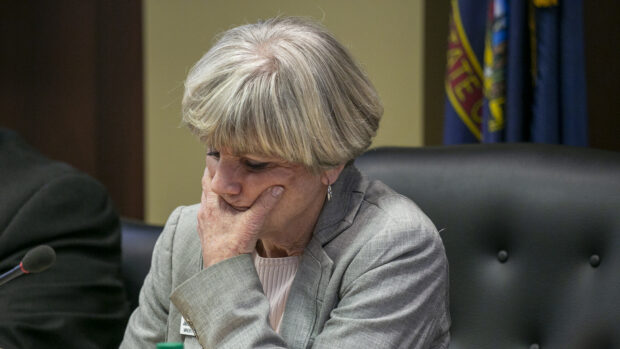The Joint Finance-Appropriations Committee has long been the hardest-working bunch at the Legislature.
Now the leaders of the powerful budget-writing panel say they want to work smarter. Shorter hearings. No presentations padded with puffery. No mad-dash spending spree at the end of the session.
Some Statehouse observers are skeptical. Some of the unease reflects a fear of the unknown, in a building where routine is as resolute as the marble halls and floors. But there’s another big reason: In the weeks ahead, JFAC will consider a grand total of close to $13.7 billion in budget requests. Any change in the process raises suspicions and invites questions about transparency and thoroughness.

After all, as JFAC co-chair and Idaho Falls Republican Rep. Wendy Horman said at a Greater Boise Metro Chamber of Commerce panel discussion Wednesday, “Your fiscal policy is your policy.” People tend to get prickly about changes in process, especially when taxpayer money is on the line.
In fairness, Horman and her Senate counterpart, Eagle Republican C. Scott Grow, have been working to explain their plans. Before outlining the changes at Wednesday’s Chamber of Commerce forum, Grow and Horman spent an hour last week fielding on-the-record process questions from Statehouse reporters. (Full disclosure: Grow and Horman also met last month with media representatives, including me, to discuss JFAC’s new policies.)
The more Grow and Horman talk about their new approach, the more the sweep of the overhaul comes into focus.
- JFAC will begin working on “maintenance budgets” next week. As the name suggests, these bills will simply cover an agency’s budget base, “(so) we can keep the lights on and the doors open,” Grow said. JFAC will address new spending proposals and line items separately.
- JFAC will write and pass some agency budget bills earlier in the session. In past years, JFAC held six weeks of hearings on agency budget requests, then started writing more than 100 budget bills in mid-February. JFAC hopes to write bills within two weeks of their hearings on agency budgets — and that means spending bills should go to the House and Senate earlier in the session.
- JFAC members will go paperless, accessing budget information and a variety of supporting documents through an upgraded public website. “We think there’s a better way to transmit information in 2024 than an 800-page binder,” Horman said.
- JFAC’s hearings will have a whole new vibe. Agency heads will no longer get to milk the clock with time-consuming PowerPoint presentations. Instead, the committee will get a no-frills budget overview from a legislative analyst, then jump straight into a question-and-answer session with the agency head.

Here’s where things get touchy.
No one’s going to mourn the demise of a mosquito-killer of an 800-page binder. But the hearings and the presentations, however long and laborious, have always been the interface between agencies and budget-writers. It’s where elected lawmakers — and engaged Idahoans — gain insight into the workings of state government.
And everything sounds dicier when you get to the heart of what JFAC leaders want to do. They want to take the time they save from the shorter public hearings, and spend it behind closed doors. JFAC members will spend the balance of the morning, before House and Senate floor sessions, in working group meetings where they will craft the budget bills.
There’s nothing new about JFAC — or any other committee — working behind the scenes to write legislation. JFAC has done this for years.
The JFAC co-chairs say their public question-and-answer sessions will be as unflinching and transparent as ever. Last week, Horman said JFAC will not bring agency heads behind closed doors to talk about their budgets.

Sen. Janie Ward-Engelking, D-Boise, a veteran JFAC member, has two big concerns about the change. She’s worried that the working group meeting schedule will lock JFAC members into spending their time on only a handful of budgets — not any budget they’re interested in. She also says the truncated hearing schedule will shortchange everyday Idahoans.
“I’m worried the public isn’t going to have the same information,” Ward-Engelking said this week. “It’s not going to be as transparent.”
There’s no way to know how this will work.
Maybe, by moving up some House and Senate budget votes, there will be fewer chances for end-of-session gamesmanship. Legislative leaders won’t be able to bring the session to a grinding halt by holding “hostage” a must-pass spending bill. Lawmakers won’t be able to extend the session by voting down a budget bill. Still, some lawmakers are going to be just as likely as ever to vote against a budget bill — especially one that gets a negative score from the Idaho Freedom Foundation.
Maybe the shorter hearings will make life easier for state officials, since they’ll spend less time under the spotlight. But on the other hand, people like Boise State University President Marlene Tromp seemed perfectly comfortable walking through a presentation built around talking points. It was only during the Q&A sessions that Tromp faltered and waffled.
Even JFAC has to get used to its new way of doing work.
On Tuesday morning, JFAC’s first budget hearing featured Alex Adams, the head of Gov. Brad Little’s Division of Financial Management. Adams spent much of his time on, um, a PowerPoint presentation. With, um, photos from highway construction projects and screenshots of news articles detailing budget crises in New York and California.
Isn’t this just the kind of stuff JFAC is trying to get rid of?
After Tuesday’s meeting, Horman chuckled and didn’t skip a beat.
“That’s a great power point,” she said.
Kevin Richert writes a weekly analysis on education policy and education politics. Look for his stories each Thursday.
